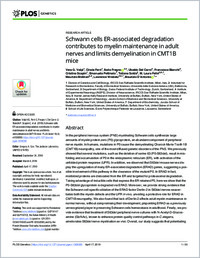Schwann cells ER-associated degradation contributes to myelin maintenance in adult nerves and limits demyelination in CMT1B mice
- Volpi, Vera G. Division of Genetics and Cell Biology, IRCCS San Raffaele Scientific Institute, Milan, Italy
- Ferri, Cinzia Division of Genetics and Cell Biology, IRCCS San Raffaele Scientific Institute, Milan, Italy
- Fregno, Ilaria Institute for Research in Biomedicine (IRB), Faculty of Biomedical Sciences, Università della Svizzera italiana, Switzerland - Department of Biology, Swiss Federal Institute of Technology, Zurich, Switzerland
- Del Carro, Ubaldo Institute of Experimental Neurology (INSPE), Division of Neuroscience, IRCCS San Raffaele Scientific Institute, Milan, Italy
- Bianchi, Francesca Institute of Experimental Neurology (INSPE), Division of Neuroscience, IRCCS San Raffaele Scientific Institute, Milan, Italy
- Scapin, Cristina Division of Genetics and Cell Biology, IRCCS San Raffaele Scientific Institute, Milan, Italy
- Pettinato, Emanuela Division of Genetics and Cell Biology, IRCCS San Raffaele Scientific Institute, Milan, Italy
- Solda, Tatiana Institute for Research in Biomedicine (IRB), Faculty of Biomedical Sciences, Università della Svizzera italiana, Switzerland
- Feltri, M. Laura Hunter James Kelly Research Institute, University at Buffalo, Buffalo, USA - Department of Neurology, Jacobs School of Medicine and Biomedical Sciences, University at Buffalo, Buffalo, USA - Department of Biochemistry, Jacobs School of Medicine and Biomedical Sciences, University at Buffalo, Buffalo, USA
- Molinari, Maurizio Institute for Research in Biomedicine (IRB), Faculty of Biomedical Sciences, Università della Svizzera italiana, Switzerland - School of Life Sciences, École Polytechnique Fédérale de Lausanne, Switzerland
- Wrabetz, Lawrence Hunter James Kelly Research Institute, University at Buffalo, Buffalo, USA - Department of Neurology, Jacobs School of Medicine and Biomedical Sciences, University at Buffalo, Buffalo, USA - Department of Biochemistry, Jacobs School of Medicine and Biomedical Sciences, University at Buffalo, Buffalo, USA
- D’Antonio, Maurizio Division of Genetics and Cell Biology, IRCCS San Raffaele Scientific Institute, Milan, Italy
-
17.04.2019
Published in:
- PLOS genetics. - 2019, vol. 15, no. 4, p. e1008069
Sciatic nerves
Nerve fibers
Neuropathy
Schwann cells
Nerves
Immunoprecipitation
Axons
Myelinated nerve fibers
English
In the peripheral nervous system (PNS) myelinating Schwann cells synthesize large amounts of myelin protein zero (P0) glycoprotein, an abundant component of peripheral nerve myelin. In humans, mutations in P0 cause the demyelinating Charcot-Marie-Tooth 1B (CMT1B) neuropathy, one of the most diffused genetic disorders of the PNS. We previously showed that several mutations, such as the deletion of serine 63 (P0-S63del), result in misfolding and accumulation of P0 in the endoplasmic reticulum (ER), with activation of the unfolded protein response (UPR). In addition, we observed that S63del mouse nerves display the upregulation of many ER-associated degradation (ERAD) genes, suggesting a possible involvement of this pathway in the clearance of the mutant P0. In ERAD in fact, misfolded proteins are dislocated from the ER and targeted for proteasomal degradation. Taking advantage of inducible cells that express the ER retained P0, here we show that the P0-S63del glycoprotein is degraded via ERAD. Moreover, we provide strong evidence that the Schwann cell-specific ablation of the ERAD factor Derlin-2 in S63del nerves exacerbates both the myelin defects and the UPR in vivo, unveiling a protective role for ERAD in CMT1B neuropathy. We also found that lack of Derlin-2 affects adult myelin maintenance in normal nerves, without compromising their development, pinpointing ERAD as a previously unrecognized player in preserving Schwann cells homeostasis in adulthood. Finally, we provide evidence that treatment of S63del peripheral nerve cultures with N-Acetyl-D-Glucosamine (GlcNAc), known to enhance protein quality control pathways in C.elegans, ameliorates S63del nerve myelination ex vivo. Overall, our study suggests that potentiating adaptive ER quality control pathways might represent an appealing strategy to treat both conformational and age-related PNS disorders.
- Language
-
- English
- Classification
- Pathology, clinical medicine
- License
- Open access status
- gold
- Identifiers
-
- RERO DOC 327028
- DOI 10.1371/journal.pgen.1008069
- ARK ark:/12658/srd1319159
- Persistent URL
- https://n2t.net/ark:/12658/srd1319159
Statistics
Document views: 187
File downloads:
- Fulltext: 202
